In an attempt to stop runaway bush fires, protect pasture and the environment, a 200km firebreak has been cleared in the commune of Chetimari – which includes Camp Sayama Forage, a displaced persons’ settlement – in the Diffa region of Niger.
The United Nations Food and Agriculture Organisation (FAO) launched a project in November last year to strengthen livelihood support for people in the central Sahel region, which faces multiple challenges, including armed conflict, climate change and the impact of covid-19.
Clearing of the firebreak, the FAO’s latest effort to help people in the region, was started on Saturday, November 13. The United Nations agency is working with the Karkara non-governmental organisation (NGO) on the project.
The firebreak would help to build resilience against the effects of climate change and would benefit nearly 2,755 households, or 20,000 people.
Alio Djibril Hamza, the head of the FAO Niger sub-office in Diffa, said: “Bush fires are a permanent risk for the meagre forage resources produced each year at the end of the agro-pastoral campaigns.”
He said the firebreak formed part of the implementation of the project, “Improving food security, nutrition and resilience of Diffa communities affected by natural shocks, climate change and conflict in the Lake Chad Basin”.
Aboubé Adamou, the prefect of the Department of Diffa said at the launching ceremony that the project would help to address the problem of food insecurity and environmental degradation. “It touches the fundamental levers of the constitution of community resilience, pledging the harmonious development of the entire nation”.
“The 2021 winter campaign, despite the poorly distributed rains in space and time, has allowed a development of a herbaceous carpet in quantity in the northern zone of the town of Chetimari,” Adamou said.
Hamza said the FAO would continue to assist populations in distress either due to natural disasters, such as climate change, or those affected by the war against extremists in the country.








